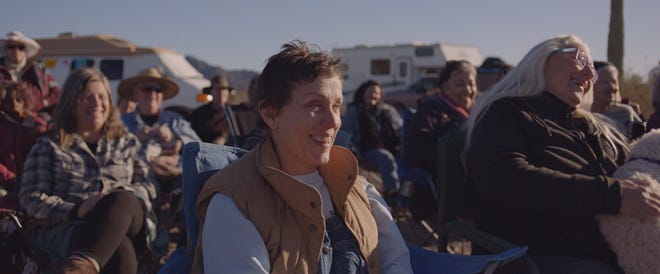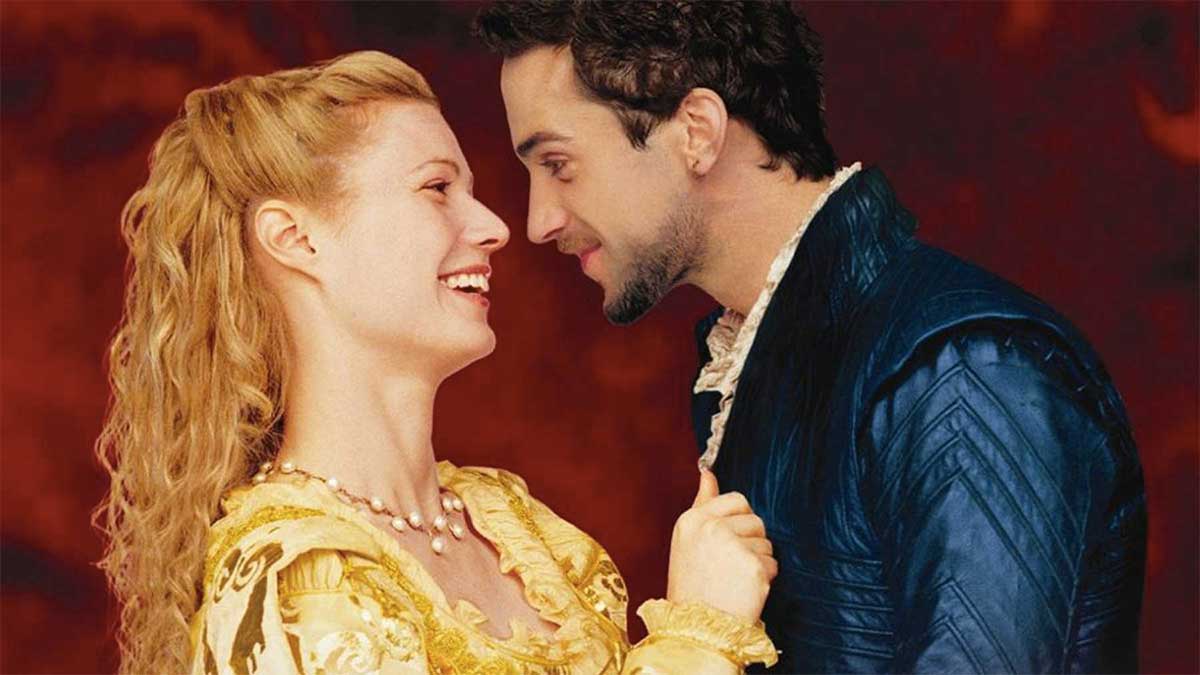Hayley: This past Sunday, Nomadland won the Oscar for Best Picture, and its director Chloé Zhao became the first woman of color to win the Oscar for Best Director. It was one of a handful high points in a bizarre ceremony that felt like something important, even if it didn't have quite that same Oscars feeling.
I enjoyed Nomadland, which isn't surprising, because it's the kind of meandering and reflective character-driven slice of life movie that I am always drawn to. The reception for Nomadland has been pretty much medium to positive, but there is a commonality among some detractors, mainly that Nomadland made working at Amazon look too appealing.
Of all the things explored in Nomadland, this feels like an odd sentiment to latch on to, mostly because I disagree, but I GUESS I'll expand. The Amazon warehouse scenes in this movie are incredibly bleak. Filming this at an actual Amazon warehouse is impressive, and I'm surprised they were given access to do so. It gives the movie an added layer of verisimilitude, one that is haunting and tenuous. It's pretty much implied that working these seasonal Amazon gigs are terrible, and this implication is made within the thematic elements of the movie. It would be weird if Fern (Frances McDormand) was like, "Hey! Everyone! Let's unionize!" or something. Nomadland is Fern's movie, and it follows Fern's choices.
Criticism is important, and critics play a valuable and necessary role in the art ecosystem. But this critique made me think more broadly of my least favorite kind of art criticism, which is "Why didn't this include everything?" Nomadland is not a documentary about the many, many crimes of Amazon. And even if it was, I am certain there would be something left out of that film.
Victoria, how do you feel about this criticism of Nomadland, and have you been frustrated by this kind of sentiment with other kinds of art?

Victoria: I basically agree with you. The backstory for Fern in Nomadland is very grief-heavy — she and her husband, who's recently passed, worked at a big factory that shut down, which also made the whole town fall apart and everyone got up and left. Some have said Nomadland is poverty porn, or that it's romanticizing these horrible things, but to me it's clear that there's a real sadness and heaviness about the things Fern and the other nomads have endured, and now they're just trying to make the best of it. There is still beauty and connection even in terrible circumstances. The film made me very sad, though I suppose the marketing has been a bit more about it being somehow uplifting which I do not think it is, at all. Fern, and other nomads, work at Amazon because it lets them survive. I don't think the movie is pro-Amazon at all.
Reading your words right now, I remember this very terrible take about Lady Bird that basically said the movie was too pro-capitalism. I'll quote:
When Lady Bird finally rejects Kyle on prom night, the final straw is her love of the Dave Matthews Band song “Crash Into Me,” which Kyle mocks. In Gerwig’s world, growing up means realizing that mainstream rock is cool and Howard Zinn is an idealistic crank. Perhaps Lady Bird’s matriculation at New York University in post-9/11 New York is the most telling choice of all, as that was the era in which its tuition started to climb into the territory of the most expensive private colleges in the US. In 2011, NYU created more student debt than any other (nonprofit) American university.
I......... Alright. The "Crash Into Me" moment isn't about "realizing mainstream rock is cool" but about realizing your friends (Julie, in the movie) are cool and fitting in with the "cool kids" is actually soul-sucking. It's not a statement about whether "Crash Into Me" is good. In fact, the moment is Lady Bird rejecting the rich kids and their rich kid life, and accepting her friend who is also not rich. The movie is not saying that Howard Zinn is bad or The People's History of the US is bad, it's just using the book to mark exactly what kind of douche-y, rich kid Timothée's Kyle is. I remember a boy I had a crush on in high school, who read War and Peace theatrically in the library, underlining words with a flourish. I think he stopped after two chapters. We watched Pulp Fiction together in French, a language neither of us spoke. There is a certain type of high school boy who uses "intellectual" things as a marker of intellectualism, whether or not they're actually engaging in them. That moment is not actually about the book, which is very good.

And then at the end, Lady Bird is somehow....blamed for not anticipating the student loan crisis??? To me Lady Bird is a person who is raised to believe in the importance of "prestige" when it comes to higher education, and who also wants to leave the west coast and go "find herself." I don't think this attitude was uncommon in 2003 (or even 2021). As I get older, I see the ways in which I, too, was indoctrinated into a system that privileges these things, a system that lets schools like NYU exist. I got my masters' degree from NYU and regret it, but I don't blame me at 21 for not realizing there was a whole scam there. I don't blame a movie about an 18-year-old girl in 2003 for not being about how NYU is a scam! Lady Bird 2 would surely cover it. (I do blame the third To All The Boys I Loved Before movie for having a solid 45 minutes of NYU propoganda.)
But to make it less specific about Lady Bird, I hate so-called movie critiques that are these sort of "gotchas." I hate much of the Youtube "film review" economy. I hate "Honest Trailers." They started as jokes, but somehow they turned into tiny complaints about things that don't matter. Oh you think Frozen relies too much on magic?? It's a Disney movie, my dude.
I also hate people who call movies "Oscar bait" because they usually don't know what they're talking about. My brother called Moonlight Oscar-bait, and it's like no that's why Moonlight is so miraculous, because it was a small indie film that they had to work hard to get made!! Eddie Redmayne playing a trans woman is Oscar bait. Parasite is not.
Hayley: I will tell you what movie is Oscar-bait, and it is 42. I recently watched this and thought...okay so when do we get a good Jackie Robinson movie? If your characters talk in political stump speeches and there is music swelling behind them every time they do something? Oscar-bait.
Your points about Lady Bird are very good and underline this problem of trying to fit every film into some sort of global narrative. Which never makes sense, because no one is living their lives thinking about the big statement they are going to make about capitalism. Or anything! This isn't to say that people aren't making a difference in the world, but that they are flawed and complex and their lives are definitely not following a narrative. I mean, not to talk about Crazy-Ex Girlfriend in every newsletter, but this is the biggest takeaway that Rebecca learns: life is not linear, it does not follow patterns, and it is messy. You can only see things clearly once you've had some space from them, and you build your own narrative from there.
So the way we criticize movies for not including every point of view is...backwards. Storytelling is a way to collect themes and emotions from life and weave them together to exaggerate their effect, heightening some things and diminishing others in a way that is compelling. We've talked before about how historical accuracy is fake, and this is all part of the same problem. We cannot know everything about a certain person from the past any more than we can our friends and relatives. Every day we are choosing what parts of ourselves to heighten, and what parts to diminish. I guess this is a long way of saying that art imitates life, to be slightly reductive about it. We find moments where life imitates art and think that somehow gives us a sense of where it's going next. It doesn't, though!
Now I feel like a high school boy trying to be intellectual. I am deeply interested in your Lady Bird 2 pitch.
Victoria: Other movies that were actually Oscar-bait: Benedict Cumberbatch's The Imitation Game. Renee Zellweger in Judy. Last year's Bombshell (bleh).
I think you're exactly right. I'm not saying that things cannot be criticized, and I think many of Nomadland's critics have good points, and I'm glad I read them. I think in any year but this one, it would not have won best picture, but I think most best picture winners from the last 40 years are much worse than Nomadland. I mean, the whole idea of giving awards for "best art" is silly! Promising Young Woman winning an Oscar has less to do with how good that movie's screenplay actually was and more to do with what the Academy voters wanted to say about art made by women, and which stories about women they think are valuable and worthwhile (I don't think it's a coincidence that PYW, which is full of violence and gore, won where Lady Bird did not).
No movie is perfect, and it's OK to like movies with flaws! In my heart, I still love Shakespeare in Love. It's not OK to pretend those flaws don't exist and everyone who disagrees with you is a mean, crazy person. But also some criticisms are silly, and that's OK, too. We also contain multitudes.

Stuff Victoria Digs
-
New Yorkers — here's a great article about why you shouldn't vote for Andrew Yang.
-
Get a jar of artichoke hearts and oven fry them. Get the ones in oil instead of water, but I made this with the water ones and it was still delicious.
- My friend sent me some beautiful teas from Brooklyn Tea and I recommend!
Things Hayley Recs
-
I enjoyed this Vox article about how a lot of post-pandemic anxiety is about going "back" to a way of doing things that is oppressive and broken.
-
This roundup of places to donate to help with India's current Covid crisis.
-
The Trader Joe's "A Dozen Macarons Variés" are an absolute delight and they're only like $5 for a dozen, which is a steal in macaron world.
Follow Gold-Plated Girls on Twitter and Instagram! Follow Hayley on Twitter and Instagram, and Victoria on Twitter and Instagram.
You just read issue #57 of Gold-Plated Girls. You can also browse the full archives of this newsletter.
